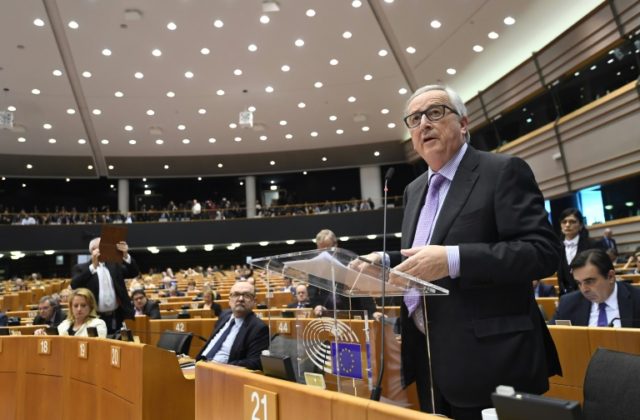Brussels (AFP) – The EU’s plans for a bigger 1.279-trillion euro multi-year budget after Brexit drew fire on Wednesday from key member countries angry that they will have to foot the bill.
France rejected “unacceptable” plans to cut funds for farmers, while the Netherlands led resistance to calls by Brussels for governments to contribute more.
The European Commission also risked a clash with eastern former Soviet-bloc countries such as Poland and Hungary over proposals to cut funds for states that violate democratic freedoms.
European Commission chief Jean-Claude Juncker insisted the budget plan for 2021-2027 was a “reasonable and responsible” way to fill a hole left by Britain’s departure, and to fund new priorities including defence.
“We made a choice to go forward and that requires a modern, simplified more flexible budget,” Juncker told the European Parliament.
The departure of Britain, a net contributor, in 2019 leaves the bloc with what Juncker says is a 15-billion euro gap in its accounts.
EU Budget Commissioner Guenther Oettinger said countries would pay 1.114 percent of their annual gross domestic product under the plans, up from one percent in the current 2014-2020 multi-year budget worth 1.0 trillion euros.
The budget must be approved unanimously by all remaining 27 EU states, and by the European Parliament. Oettinger called for it to be agreed on by the time EU leaders hold their first post-Brexit summit in Romania in May 2019.
– ‘Drastic, massive and blind’ –
Of the cuts proposed by Brussels, one of the biggest is the five percent from the Common Agricultural Policy, the largest single area of EU spending and one dear to major farm producer France.
“Such a drastic, massive and blind cut is simply unimaginable,” a statement from the agriculture ministry said, adding that France “will not accept any decrease in direct income for farmers”.
The calls for greater national contributions met resistance from the leaders of the Netherlands, Denmark and Austria, who said a smaller, post-Brexit EU should mean a smaller budget.
“This proposal is not an acceptable outcome,” Dutch Prime Minister Mark Rutte said, adding a smaller bloc “entails making clearer choices and spending less.”
The Netherlands has emerged as one of the toughest states on money matters now that Britain is leaving.
Danish Prime Minister Lars Lokke Rasmussen tweeted that “a smaller EU should mean a smaller budget!”.
Austrian Chancellor Sebastian Kurz said the proposal was “far from being an acceptable solution” and warned of “tough negotiations ahead.
The German government however said it was an “important first step” towards a reformed EU, which has been deeply shaken by the rise of populist parties and the shock of Brexit.
– ‘Rule of law’ –
Meanwhile the European Commission proposed a seven-percent cut to so-called cohesion funds, the biggest beneficiaries of which are former Soviet bloc states in eastern Europe. It corrected an earlier figure of five percent.
Far more controversially, it also proposed for the first time to “suspend, reduce or restrict access” to funds for member states that breach the rule of law.
Warsaw, along with Budapest, has been at loggerheads with Brussels over democratic standards and their refusal to accept refugees.
Juncker said the commission is “proposing a new mechanism that will allow for the protection of the budget linked to risks arising from deficiencies in the rule of law.”
Poland reacted warily to the idea.
“There can be no space for arbitrariness,” Poland’s deputy European affairs minister Konrad Szymanski said in a statement.
But Szymanski, reflecting his government’s recent bid to resolve its two-year standoff with Brussels, said Warsaw did not see the proposals as “confrontational”.
Brussels wants to spend more on the digital economy, research, defence and protection for the bloc’s borders against mass migration, including what one European source says is a quintupling of the border force Frontex to nearly 6,000 people.
Taxes on carbon emissions, plastic waste, and corporations could also contribute 22 billion euros annually, or 12 percent of total budget revenue, the commission said.

COMMENTS
Please let us know if you're having issues with commenting.